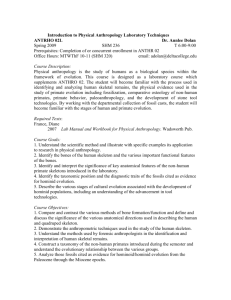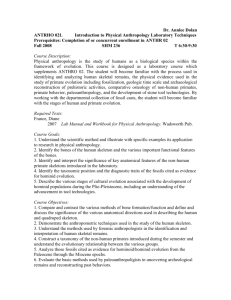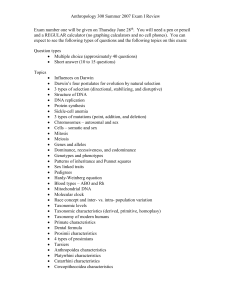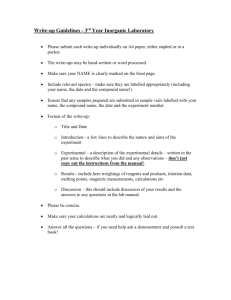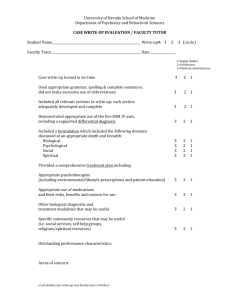Human Origins
advertisement
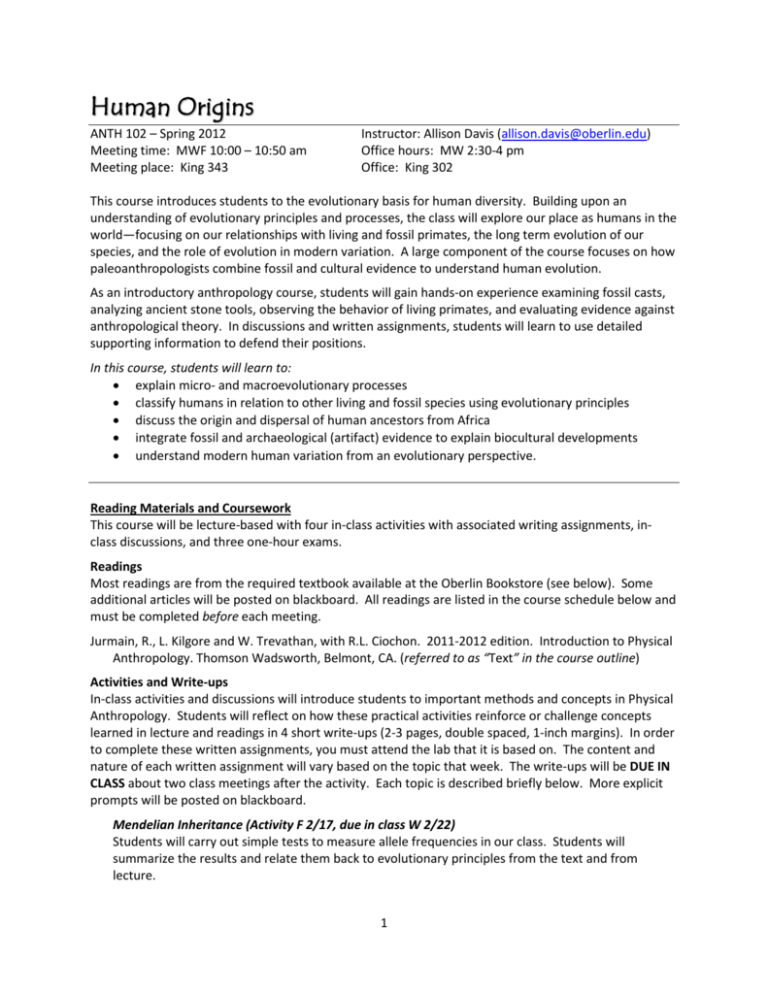
Human Origins ANTH 102 – Spring 2012 Meeting time: MWF 10:00 – 10:50 am Meeting place: King 343 Instructor: Allison Davis (allison.davis@oberlin.edu) Office hours: MW 2:30-4 pm Office: King 302 This course introduces students to the evolutionary basis for human diversity. Building upon an understanding of evolutionary principles and processes, the class will explore our place as humans in the world—focusing on our relationships with living and fossil primates, the long term evolution of our species, and the role of evolution in modern variation. A large component of the course focuses on how paleoanthropologists combine fossil and cultural evidence to understand human evolution. As an introductory anthropology course, students will gain hands-on experience examining fossil casts, analyzing ancient stone tools, observing the behavior of living primates, and evaluating evidence against anthropological theory. In discussions and written assignments, students will learn to use detailed supporting information to defend their positions. In this course, students will learn to: • explain micro- and macroevolutionary processes • classify humans in relation to other living and fossil species using evolutionary principles • discuss the origin and dispersal of human ancestors from Africa • integrate fossil and archaeological (artifact) evidence to explain biocultural developments • understand modern human variation from an evolutionary perspective. Reading Materials and Coursework This course will be lecture-based with four in-class activities with associated writing assignments, inclass discussions, and three one-hour exams. Readings Most readings are from the required textbook available at the Oberlin Bookstore (see below). Some additional articles will be posted on blackboard. All readings are listed in the course schedule below and must be completed before each meeting. Jurmain, R., L. Kilgore and W. Trevathan, with R.L. Ciochon. 2011-2012 edition. Introduction to Physical Anthropology. Thomson Wadsworth, Belmont, CA. (referred to as “Text” in the course outline) Activities and Write-ups In-class activities and discussions will introduce students to important methods and concepts in Physical Anthropology. Students will reflect on how these practical activities reinforce or challenge concepts learned in lecture and readings in 4 short write-ups (2-3 pages, double spaced, 1-inch margins). In order to complete these written assignments, you must attend the lab that it is based on. The content and nature of each written assignment will vary based on the topic that week. The write-ups will be DUE IN CLASS about two class meetings after the activity. Each topic is described briefly below. More explicit prompts will be posted on blackboard. Mendelian Inheritance (Activity F 2/17, due in class W 2/22) Students will carry out simple tests to measure allele frequencies in our class. Students will summarize the results and relate them back to evolutionary principles from the text and from lecture. 1 Primate Observation (Activity F 3/2, Due in class W 3/7) Students will observe primate behavior on video, take notes, and consider how modern primate behavior can help us learn about early human ancestors. Bones and Tools, Part 1 (Activity W 3/21, Due in class M 4/2) Students will examine casts of fossil primates and early human ancestors to understand the biological basis for classification. Students will also examine early stone tools to consider the role that human behavior plays in classification. Bones and Tools, Part 2 (Activity W 4/11, Due in class M 4/16) Students will contrast pre-modern and modern human skulls to understand the biological basis for classification. Students will also compare early stone tools (from Part 1) with tools used by modern humans to consider behavioral differences. Discussion Preparation The second half of the course will include several discussions that will require you to synthesize a variety of information learned throughout the term. In order to ensure that we have lively and informative discussions, these topics will require preparation before class. For these days, you will create a list or a short (½ page single spaced) paragraph that includes points you would like to make during discussion. The ideas you include should come from readings, lectures, activities, and personal reflection. Advanced preparation should stimulate debate and encourage those who are usually reserved in class discussions to contribute to conversations. These assignments will be collected in class and will contribute to your participation grade. Each topic is described below. Multiregionalism vs. Replacement (M 4/16) Go through Ch. 14 and create two lists: (1) A list of all the evidence that supports the complete replacement model, and (2) A list of all the evidence that supports the regional continuity model. Making Sense of New Discoveries (W 4/18) Find a news or scholarly article about a new discovery from Paleoanthropology made in the last year (Since April 2011). Write a paragraph or create a list about how the discovery fits into our current understanding of Human Evolution or how the discovery challenges it. Race and Racism (W 5/2) Read an article describing the conception of race in Physical Anthropology over the last century. Select one other article (from Art, Medicine, or Geography, see below). Write a paragraph or create a list that compares the conceptions of race in both articles. Teaching Evolution in Public Schools (W 5/9) Find and read one article about teaching creationism in public schools. Write a paragraph or create a list that relates the article you read to the Indiana case being debated this year. Exams This course will have three one-hour exams held during class meetings and during the scheduled Final Exam time (see schedule below). You must plan to attend the final exam. No rescheduling is allowed. Late Paper Policy Late papers will not be accepted without prior written permission of the Instructor. Class Participation The class participation grade is meant to encourage an atmosphere of respect and active academic engagement. The majority of this grade will be based on attendance and participation in discussions (including Discussion Preparation described above). In order to participate fully, you must come 2 prepared to class. Therefore, this portion of your grade may include pop quizzes based on the readings. In addition, to minimize distractions, you may not use laptops, cell phones, or other devices for personal use during class (Facebook, email, video games, reading the newspaper, knitting, etc.). If you do, you must leave class and one point will be subtracted from your participation grade for each occurrence. Grading Class Participation Writing Assignments (7 points x 4) Exams (20 points x 3) 8% 32% 60% Honor Code Students will complete all writing assignments and exams independently. At the end of each graded assignment you are required to write and sign the Oberlin honor pledge: “I affirm that I have adhered to the Honor Code in this assignment”. For more information about the Honor System please see: www.oberlin.edu/students.links-life/rules-regs.html. Students with Disabilities Policy Students with disabilities should see the instructor at the beginning of the semester to arrange accommodations for coursework, assignments, and exams. Important Dates F 2/17 W 2/22 F 3/2 W 3/7 F 3/9 F 3/21 M 4/2 W 4/11 M 4/16 M 4/16 W 4/18 F 4/20 M 4/25 W 5/2 W 5/9 W 5/16 Lab: Mendelian Inheritance Write-up due Lab: Primate Observation Write-up due Exam 1 Lab: Bones and Tools, Part 1 – Location TBD Write-up due Lab: Bones and Tools, Part 2 – Location TBD Write-up due Discussion: Multiregionalism vs. Replacement (prep required) Discussion: New Discoveries (prep required) Class cancelled Exam 2 Discussion: Race (prep required) Discussion: Teaching Evolution (prep required) Exam 3 (7-9 pm) Course Schedule Introductions and the Basics of Evolution M 2/6 Introduction No required reading 3 W 2/8 What is Physical Anthropology? Required reading Text Ch. 1 F 2/10 The History of Evolutionary Thought Required reading Text Ch. 2 M 2/13 Genes and Reproduction Required reading Text Ch. 3 W 2/15 Heredity and Evolution Required reading Text Ch. 4 F 2/17 In-Class Lab Activity: Mendelian Inheritance Required reading Review p. 80-92 M 2/20 Classification and Definition of Species Required reading Text Ch. 5., p. 111-128 W 2/22 The Human Place in the Mammal World Required reading Text Ch. 5, p. 128-139 Primates F 2/24 Introduction to the Living Primates Required reading Text Ch. 6 Write-up 1 Due In Class M 2/27 Primate Behavior Required reading Text Ch. 6 W 2/29 Primate Models Required reading Text Ch. 8 F 3/2 In-Class Lab Activity: Primate Observation No required reading M 3/5 Primate Evolution Required reading Text Ch. 9 W 3/7 Exam Review No required reading Write-up 2 Due In Class F 3/9 EXAM 1 IN CLASS 4 Hominin Evolution M 3/12 Paleoanthropology: Combining Culture and Biology Required reading Text Ch. 10 W 3/14 Origins in Africa Required reading Text Ch. 11 F 3/16 Film and Discussion: Becoming Human, Part 1: First Steps M 3/19 Early Dispersal from Africa Required reading Text Ch. 12 W 3/21 Lab: Bones and Tools, Part 1 No required reading F 3/23 Film and Discussion: Becoming Human Part 2: Birth of Humanity 3/24 -4/1 SPRING RECESS – NO CLASS M 4/2 Glacial Cycles and Pre-Modern Humans Required reading Text Ch. 13, p. 366-378 Write-up 3 Due In Class W 4/4 Neandertals During the Last Glaciations Required reading Text Ch. 13, p. 378-402 F 4/6 Modern Humans – Fossils Required reading Text Ch. 14, p. 403-423 M 4/9 Modern Humans – Upper Paleolithic Technology and Art Required reading Text Ch. 14, p. 423-431 W 4/11 Lab: Bones and Tools, Part 2 No required reading F 4/13 Film and Discussion: Becoming Human Part 3: Last Human Standing M 4/16 In-class Discussion: Multiregionalism vs. Replacement Preparation: Go through Ch. 14 and create two lists: (1) A list of all the evidence that supports the complete replacement model, and (2) A list of all the evidence that supports the regional continuity model. Bring these lists to class. Write-up 4 Due In Class 5 W 4/18 In-class Discussion: Making Sense of New Discoveries Preparation: Find a news or scholarly article about a new discovery from Paleoanthropology (fossil or otherwise) in the last year (Since April 2011). Write a paragraph or create a list about how the discovery fits into our current understanding of human evolution or how the discovery challenges it. Bring the article and a printed copy of your points to class. F 4/20 CLASS CANCELLED – SOCIETY FOR AMERICAN ARCHAEOLOGY ANNUAL MEETING M 4/23 Exam Review W 4/25 EXAM 2 – IN CLASS Modern Human Variation F 4/27 Human Variation Required reading Text Ch. 15 M 4/30 Adaptation: Skin Color and Body Shape Required reading Text Ch. 16 W 5/2 In-class Discussion: Race and Racism Required reading Caspari, R. (2003). "From Types to Populations: A Century of Race, Physical Anthropology, and the American Anthropological Association." American Anthropologist 105(1): 65-76. Plus, choose one of the following Carrera, M. M. (1998). "Locating Race in Late Colonial Mexico." Art Journal 57(3): 3745. (Art History) Corbie-Smith, G., G. Henderson, et al. (2008). "Conceptualizing Race in Research." Journal of the National Medical Association 100(10): 1235-1243. (Medicine) Saldanha, A. (2011). "The Concept of Race." Geography 96(1): 27-33. (Global Inequality) Preparation: Write a paragraph or create a list that compares the conceptions of race in the Caspari article and the article of your choice. Bring this to class. Online Activity: Global Census http://www.understandingrace.org/lived/global_census.html F 5/4 Biocultural Evolution and the Life Cycle Required reading Text, Ch. 17 M 5/7 Evolution and Disease Required reading Text, pages TBD 6 W 5/9 In-class Discussion: Teaching Evolution in Public Schools Required reading TBD – The assignment will be a news article relating to the current Indiana Bill that would allow teaching creationism in science class (approved by the State Senate on 1/31/2012, see “Indiana Senate Backs Teaching Creationism” http://www.journalgazette.net/article/20120131/NEWS07/120139894) Preparation: Find and read one additional article about teaching creationism in public schools. Write a list or paragraph that relates the article describing the Indiana case. Bring this to class. F 5/11 Course Conclusions and Exam Review EXAM 3: Wednesday, May 16, 7 – 9 pm, Room TBA ! NO RESCHEDULING ALLOWED ! 7
